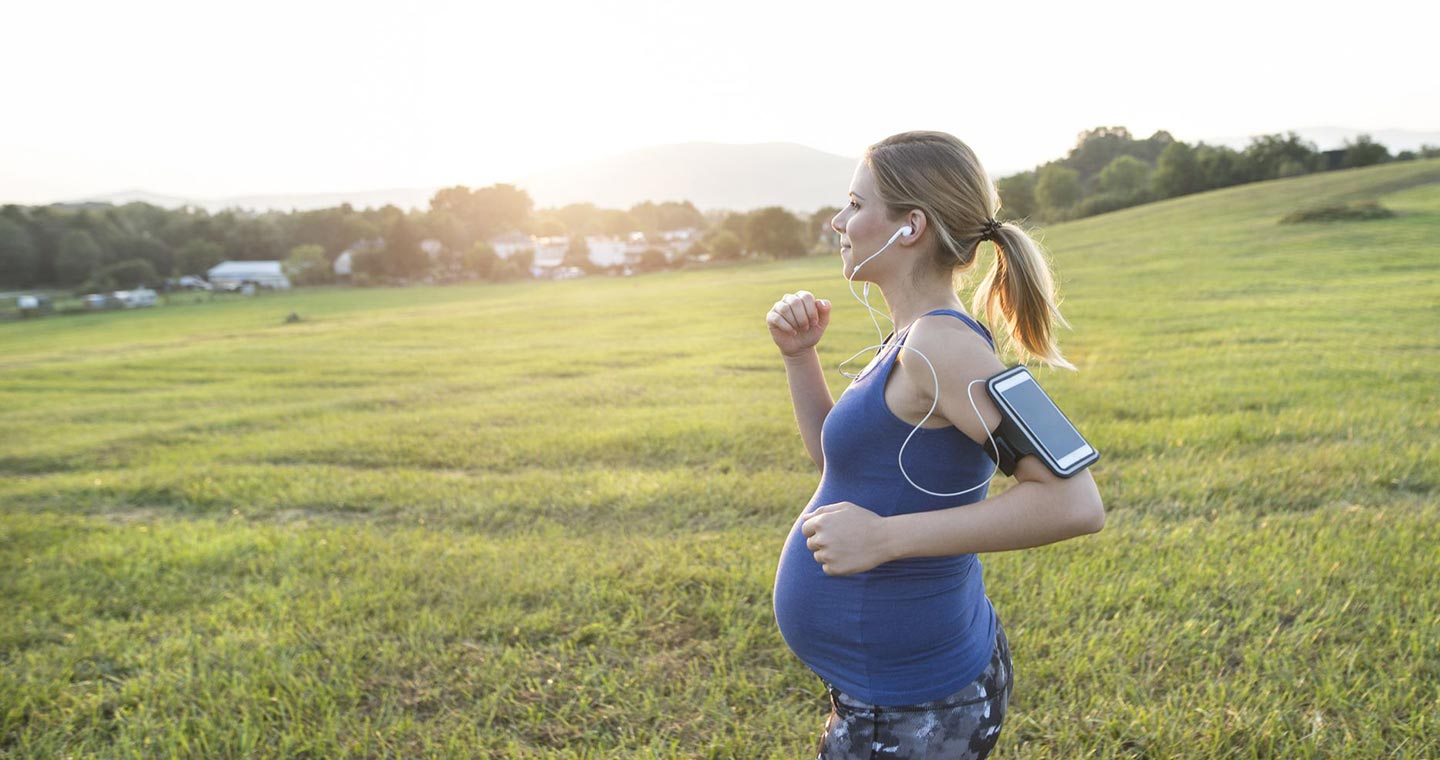Call Us
by Laurel Brewster MScPT
Pelvic Physiotherapist
updated Nov 18, 2021
Many women are told that they should stop running while pregnant. There are definite circumstances where it is advised to stop running and other high intensity activity, and if this advice was provided by a medical professional, it should be followed. However, in most healthy women, it is safe and beneficial to continue running or jogging while pregnant. In this article we will cover safety, comfort, and helpful tips for the pregnant runner!
Is it safe to run while pregnant?
In a healthy woman, with a healthy pregnancy, running is safe. According to the American College of Obstetricians and Gynecologists, it is recommended that pregnant women engage in aerobic and strength-conditioning exercises before, during and after pregnancy.
Unless you have a medical condition where you are advised against aerobic exercise during pregnancy, running can provide many health benefits to the mother and baby. After an appropriate assessment by your family doctor or physical therapist, a moderate intensity exercise program is recommended for 20-30 minutes, 5-7 days of the week .
What are the benefits of running during pregnancy? (or other moderate intensity exercise):
- Higher chance of vaginal delivery
- Lower gestational weight gain
- Reduced chance of gestational diabetes
- Reduced risk of preeclampsia
- Reduced chance of preterm delivery
- Reduced chance of cesarean section
- Reduced chance of low birth weight
- Reduced muscle and joint pain
- Faster postpartum recovery
- Reduced risk of postpartum depression
- Helps to maintain a healthy pregnancy weight
What are pregnancy complications that require a health care provider consultation prior to exercising?
- Preeclampsia
- Severe anemia
- Heart or lung conditions
- Prenatal vaginal bleeding
- Placental conditions
- Having multiple babies (expecting a preterm labour)
Can I start running while I’m pregnant?
Generally it is safe for the mother and the baby to run while pregnant. As long as there are no complications with the mother’s health or the pregnancy.
Can I run if I’ve never run before?
Running is a moderate-high intensity exercise. If you were not previously a runner, your body may not be equipped to start running, pregnant or not! It is advised that you talk to your doctor or physiotherapist about how to prepare your body to run. It is important to have adequate strength, endurance, balance and impact absorption before you make running part of your prenatal exercise routine. If you do not have adequate physical fitness it may lead to pelvic pain, calf pain and other common running injuries.
Helpful hints for running while pregnant
Keep hydrated
Your body needs extra hydration while breastfeeding and for the health and development of your baby. Exercise and sweat reduce your water content, so it is important to remember to drink lots of water! Drinking water before, during and after your run will also help regulate your body temperature. It is much easier to overheat when you are pregnant.
Get comfortable and supportive running shoes
You will be carrying extra weight during your run, and this will only increase as you progress through your pregnancy. As your body changes, the way you weight bear through your feet will also change. It is important to have a pair of shoes that will provide you with the comfort and shock absorption that your growing body will need.
Supportive garments for pregnant runners
As your body changes and grows, you may find that you need additional support in certain areas. A supportive sports bra will help reduce the stress on your growing chest. You will likely need stronger support than your usual sports bra. There are also nursing sports bras on the market that you can continue to use after the baby is born. You may find the stress on your abdomen becomes too much with running (or with daily life, for that matter!). There are pregnancy braces that will provide support around your low back and help to manage the weight of your baby.
Resistance training
Be sure to include strength training in your exercise routine. Strengthening the core and lower body will help support your joints and reduce stress on the body as ligament laxity increases. As your baby grows, the weight you are carrying will increase, adding new loads and stresses on your body. The stronger you are, the better your body will adapt to these changes.
Diet
Running is a higher intensity activity. You will sweat more and burn more calories. You will need to increase your caloric intake slightly to support the growth of your baby. Nutrients and fats from your diet will directly affect the growth of the fetus. It is important to keep a well balanced diet, in addition to your exercise.
Washroom breaks
As the baby grows, there is more pressure on your bladder and less room for it to expand and fill completely. This leads to more frequent urination. When going for a run, you can stick to a treadmill, or try not to run too far from home, in case you need to get to a washroom quickly!
What are the signs that a pregnant woman should stop running?
- Bleeding
- Joint pain
- Leakage (stress urinary incontinence)
- Stress/pain on the breasts or abdomen
- Dizziness
- Severe shortness of breath
- Chest pain
- Balance issues
If you are experiencing any of these symptoms, contact your OBGYN, midwife, or pelvic floor physiotherapist as you may be at increased risk of medical complications.
Don’t push yourself!
As you enter the second and third trimesters, you may find that exercising and running or jogging, becomes more difficult. As your pregnancy progresses, it’s harder to move, your energy level is lower, and you are likely ready for this baby to come!
It is normal to reduce your frequency or intensity of exercise. You do not need to stop running and exercising, unless it becomes too uncomfortable for you. It helps your physical health and mental health to keep up with some form of physical activity. So instead of cutting out all activity, run a shorter distance, run at a slower pace, or reduce the load or intensity of your exercises. Replace running with walking, swimming, or other lower impact, lower intensity activities if needed.
Ultimately, staying active to some level throughout your pregnancy is generally safe and will help with the labor and the development of your baby. It will help to manage weight gain, and aid in postpartum recovery or return to activity after the baby arrives.
If you have any questions about returning to running postpartum, click here and take a look at the following article
REFERENCES
The American College of Obstetricians and Gynecologists. Physical Activity and Exercise During Pregnancy and the Postpartum Period. ACOG Committee Opinion No. 804, April 2020.
Berghella V., Saccone G. (2017). Exercise in Pregnancy! American Journal of Obstetrics and Gynecology, 216, 335-337.
Mihevc-Edwards, K., & Green, B. (2019). Go Ahead Stop and Pee: Running During Pregnancy and Postpartum. The Space Between, USA.

Questions? We're happy to help!
Choosing the right service provider can be a big decision. We’re dedicated to answering any questions you have to help you make the best choice. Contact us today and ask us anything!
Call us at (416) 238-6749





